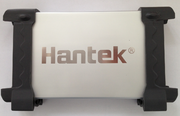Hantek 4032L
Jump to navigation
Jump to search
 | |
| Status | planned |
|---|---|
| Channels | 32 |
| Samplerate | 400MHz |
| Samplerate (state) | ? |
| Triggers | edge, bus value range, pattern, pattern duration, combined |
| Min/max voltage | -6V — +60V input, -6V — +6V threshold |
| Memory | 2Gbit (64M samples x 32) |
| Compression | - |
| Website | hantek.com |
The Hantek 4032L is an USB-based, 32-channel logic analyzer with up to 400MHz sampling rate and 2Gbit DDR2 memory.
See Hantek_4032L/Info for more details about the device.
Hardware
- Xilinx Spartan-6 XC6SLX16 CSG324 DIV1225 (FPGA, 14579 logic cells, 2 DDR1/2/3 memory controllers, BGA324)
- Cypress FX2LP CY7C68013A-100AXC (USB 2.0 HS controller, TQFP100)
- 2x Micron MT47H64M16HR-25E:H (1Gbit DDR2 SDRAM, BGA)
- TI TPS51116 (DDR memory power controller)
- Unknown I2C EEPROM (marking removed, contains FX2 firmware)
- MXIC MX25L4005 (4Mbit SPI flash, marking removed, contains FPGA bitstream)
- Unknown PWM components (marking removed, input Vref generators)
Photos
Protocol
- Vendor request is used to reset the engine and flush the buffers
- Endpoint 2 is used for host-to-device command/parameters transfers
- Endpoint 6 is used for device-to-host status/data transfers
X denotes "any value" in the following description
Vendor requests
- bRequest=0xB3, wValue=X, wIndex=X, wLength=0x0A, data={ 0x0F, 0x03, 0x03, 0x03, X, X, X, X, X, X } - restart the engine (reset FPGA, reset FIFOs)
- bRequest=0xD0, wValue=X, wIndex=X, wLength=0x00 - disable communication (set FIFO reset), not used
- bRequest=0xD0, wValue=X, wIndex=X, wLength=0x00 - enable communication (clear FIFO reset), not used
Command/Parameters packet
struct CmdParamsPacket
byte Magic[2]={ 0x7F, 0x01 }
byte SampleRate
0x22 - 400MS/s
0x23 - 320MS/s
0x20 - 200MS/s
0x21 - 160MS/s
0x00 - 100MS/s
0x08 - 80MS/s
0x01 - 50MS/s
0x09 - 40MS/s
0x02 - 25MS/s
0x0A - 20MS/s
0x03 - 12.5MS/s
0x0B - 10MS/s
0x04 - 6.25MS/s
0x0C - 5MS/s
0x10 - 4MS/s
0x05 - 3.125MS/s
0x0D - 2.5MS/s
0x11 - 2MS/s
0x06 - 1.5625MS/s
0x0E - 1.25MS/s
0x12 - 1MS/s
0x07 - 781.25KS/s
0x0F - 625KS/s
0x13 - 500KS/s
0x14 - 250KS/s
0x15 - 125KS/s
0x16 - 62.5KS/s
0x17 - 31.25KS/s
0x18 - 16KS/s
0x19 - 8KS/s
0x1A - 4KS/s
0x1B - 2KS/s
0x1C - 1KS/s
byte TrigFlags
bit 0 - enable trigger 1 (main)
bit 1 - enable trigger 2 (advanced)
bit 2 - trigger logic, 0 - T1 or T2, 1 - T1 and T2
word PwmA - channel A Vref PWM value, pseudocode:
-6V < ThresholdVoltage < +6V
Vref = 1.8-ThresholdVoltage
if Vref>10.0
Vref = 10.0
if Vref<-5.0
Vref = -5.0
pwm = ToInt((Vref + 5.0) / 15.0 * 4096.0)
if pwm>4095
pwm = 4095
word PwmB - channel B Vref PWM value
byte unused[2]
dword SampleDepth - sample depth in bits per channel, 2k-64M, must be multiple of 512
dword PretriggerDepth - pretrigger buffer depth in bits, must be < SampleDepth
struct Trig Trig1 - trigger 1 config, see below
struct Trig Trig2 - trigger 2 config, see below
byte Command[2] - command, see Commands and responses below
struct Trig
dword Flags - trigger types selection:
bit 4:0 - edge trigger signal, 0-31 -> A0-B15
bit 6:5 - edge to trigger on:
00 - rise
01 - fall
10 - rise or fall
11 - edge trigger disabled
bit 7 - unused
bit 9:8 - data range trigger type:
00 - data=RangeMax trigger
01 - data=RangeMin or data=RangeMax trigger
10 - data<RangeMin or data>RangeMax trigger
11 - RangeMin<data<RangeMax trigger
bit 11:10 - time range trigger type:
00 - time=TimeMax trigger
01 - time=TimeMin or time=TimeMax trigger
10 - time<TimeMin or time>TimeMax trigger
11 - TimeMin<time<TimeMax trigger
bit 12 - enable data range trigger (see bit 9:8)
bit 13 - enable time trigger (see bit 11:10)
bit 15:14 - unused
bit 17:16 - combined trigger data selection (data=EquData and data_sel matches other criteria like time, range, edge):
00 - data_sel is next data (next to matched with EquData)
01 - data_sel is current data
10 - data_sel is previous data
11 - undefined
bit 18 - enable combined trigger (see bit 17:16)
bit 31:19 - unused
dword RangeMin - min value for data range trigger (see Flags[9:8]), must be masked with RangeMask (see Masking below)
dword RangeMax - max value for data range trigger (see Flags[9:8]), must be masked with RangeMask
dword TimeMin - min value for time trigger (see Flags[11:10])
dword TimeMax - max value for time trigger (see Flags[11:10])
dword RangeMask - mask value for data range trigger
dword EquMask - mask value for combined trigger
dword EquData - data value for combined trigger (see Flags[17:16]), must be masked with EquMask
Masking:
Some trigger types (data range, combined "pattern and condition") operate on a "bus" value of several signals selected with a mask. Active bits are combined to a single value WITHOUT GAPS:
mask=01000011, value=11010001 -> masked_value=00000101 (bits 6,1,0 are combined and zero-extended)
Commands and responses
{ 0x1A, 0x2B } - configure and start capture, all parameters are used
Response: none
{ 0x3A, 0x4B } - get status, parameters are defaults
Response:
dword Magic=0x2B1A037F - drop rx data until this)
dword CurrentDataValue - A0-B15 current state snapshot
dword CaptureStatus - 0-not finished, 1-?, 2-done, data is ready
dword DummyData[244] - pad to 1024 bytes
{ 0x5A, 0x6B } - get captured data, parameters are defaults
Response:
dword Magic=0x2B1A027F - drop rx data until this
dword CaptureData[SampleDepth] - capture data
dword EndMarker=0x4D3C037F - drop rx data after this till end of 512 byte packet
Acquisition session flow
- Send restart vendor request (0xB3)
- Send { 0x1A, 0x2B } type packet to configure and start capture
- Poll with { 0x3A, 0x4B } until CaptureStatus=2 (optionally blink bus indicators according to CurrentDataValue during poll)
- Get capture data with { 0x5A, 0x6B }




